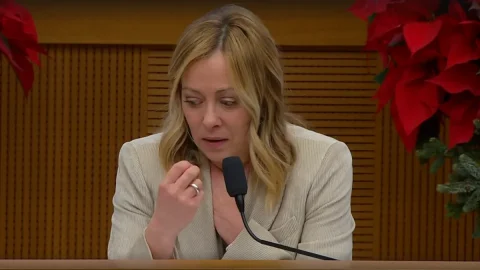Just on the day when the first doses of Janssen, the anti-Covid vaccine by Johnson & Johnson, US blocks usage of single-dose serum. According to New York Times, the American Drug Authority (Food and Drug Administration) and the Centers for Disease Control will block Janssen injections at federal sites and ask individual US states to do the same.
This is a temporary measure, aimed at further investigations into possible security problems. In particular, it was they who triggered the alarm six cases in the United States which they developed a rare disease, responsible for creating blood clots within two weeks following vaccination.
All six cases concern women between the ages of 18 and 48writes the NYT, citing officials briefed on the case. One of the women involved died, while a second, in Nebraska, was hospitalized in critical condition.
"We recommend a break in the use of this vaccine out of caution," the Food and Drug Administration announced on Twitter.
About 6,8 million people in the United States have received the Johnson & Johnson vaccine so far. The distribution of the J&J vaccines has also been blocked in Europe.
The pharmaceutical company points out that “at the moment no clear causal link has been established between the rare thromboembolic events reported and the Janssen anti-Covid vaccine".
Meanwhile, they arrived in the afternoon at Pratica di Mare airport 184 thousand doses of the Johnson & Johnson vaccine, the first batch destined for Italy. Immediately after the news of the American stop, she was summoned a meeting at the Ministry of Health at 16pm on Tuesday, with the participation of the Italian Medicines Agency.
In the end, however, the decision was made from above. Johnson & Johnson has indeed decided to postpone the distribution of the vaccine in Europe: “We have examined the American cases with the European health authorities – let the pharmaceutical company know – and we have decided to proactively delay the launch of our vaccine in Europe. We have worked closely with medical experts and health authorities and strongly support the open communication of this information to healthcare professionals and the public."
The European Medicines Agency (Ema) reiterated that “at the moment it is not clear whether there is a causal link between the vaccination with Johnson & Johnson's Covid-19 drug and the cases of blood clots”. The European agency's safety committee "is investigating and will decide whether regulatory action might be necessary."
Consequently, the doses that arrive in Italy will remain stored pending checks. "In our containers, the doses can be stored for up to two years, there is plenty of time for the necessary investigations and then to proceed", she explained to Rainews 24 Stefano Sbaccanti, of the commissioner structure for the Covid emergency.
Janssen on March 11 became the fourth anti-Covid vaccine authorized in the EU after those of Pfizer, Moderna and AstraZeneca. The effectiveness of the product – explained the EMA – was demonstrated in a clinical study involving over 44 people aged 18 and over in the United States, South Africa and Latin American countries. The study found a 67% reduction in the number of symptomatic Covid cases after 2 weeks in people who received the Janssen vaccine (116 cases out of 19.630 people), compared to people who were given placebo (348 people out of 19.691). Unlike other vaccines, J&J's is single-dose, and for this reason too it is considered a fundamental weapon for the continuation of mass vaccination.
For Sputnik, India announced that it has given the green light to the Russian vaccine, which is now licensed in 60 countries with a total population of more than 3 billion people.





